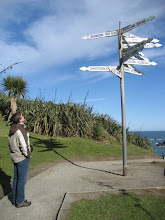Travel Considerations Provided by the Following...
by Ryan
Guest Post
The inevitable happened. William, who has been traveling to and from Mexico of late, brought back the most obvious stowaway: swine flu. It's made the rounds in the house, but we've survived and managed not to spread it any farther.
Though we in the U.S. have had our brush with swine flu, many of us have largely put it behind us. We understand its severity and that we all know someone who's been affected by it--and survived without too much worry. Online, you'll find articles (like
this and
this) calling this the year of the 2009 flu pandemic. But personally, I'm not too worried about it. Initially, people speculated that swine flu would rival huge-scale and deadly pandemics like the
Spanish Flu of 1918, the
Asian Flu of 1957, or the
Hong Kong Flu of 1968 (overview
here). It doesn't appear to be the case anymore. People get sick, then go on with their lives.
How is it we've gone from crazy to carefree?
My answer is, the same way we forget that malaria, AIDS, cholera, and rabies continue all over the world, largely unnoticed by us. Whatever we have to say about our health care (and recent months have proven that many of us have a lot to say about it, whether we
understand it or
not), Americans are generally healthy. We fret over the common cold more than malaria, contracting cancer than AIDS. Diabetes and heart disease are more real evils to us than are famine and pestilence.
Changing locales, however, means changing perspectives. Malaria is rampant in many parts of the developing world. Missions to Sub-Saharan Africa to battle poverty inevitably bring AIDS to the forefront. Prepare yourself for the ailments of your destination, rather than those of your origin.
Visit a travel clinic, such as
King County's. Travel clinics are often more prepared for travel questions and concerns than your general practitioner. They also usually have vaccines on hand and can write prescriptions for drugs important to travel. For more information about travel ailments, preventative measures and medicines against them--including where and how to get them while abroad--visit the
CDC website.
Immunizations, Vaccinations
Get
immunized and
vaccinated before you go abroad. Shell out the dough and embrace your right to be healthy all over the world. Here's one preventative measure--a kind of prepaid insurance plan--that could save your life.
The vaccines may be costly, but they are most certainly worth it. The rabies vaccine is hundreds of dollars, yet few places in the world are rabies-free. The vaccine allows an infected person more time to get to a facility with the proper treatment. The cost more than makes up for the discomfort, subsequent cost of care, and is worth the extra time it would take to get to a hospital with the cure. [I got it when traveling to places in
Africa with lots of animals and little medical care. --William]
It's also important to allow enough time before travel for multiple immunization/vaccination shots, which is the case for the Hepatitis vaccination series. Equally important is the fact that some of these shots cannot be taken one after the other; there is a necessary window between doses of the
HepB vaccine, for instance.
Prescriptions
Travel clinicians can prescribe drugs, such as
ciprofloxacin for
traveler's diarrhea or
acetazolamide for
altitude sickness--among others. Your general practitioner can prescribe the same drugs, but they don't always have the right information about a location at their fingertips. Patronize your local travel clinic, because they often suffer from budget cutbacks, though they often offer cheaper services than your own GP. In the event that you run out of a drug abroad, it's possible to get a replacement in-country. Do some research beforehand though. Fake drugs can be found everywhere.
